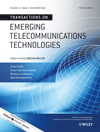Energy-efficient exploration and exploitation of multichannel diversity in spectrum sharing systems
ABSTRACT
This letter investigates the problem of energy-efficient exploration and exploitation of multichannel diversity in spectrum sharing cognitive radio systems where the secondary user sequentially explores the channel state information on the licenced channels with time and energy consumptions. As the number of the explored channels increases, the achieved multichannel diversity gain increases and so does the exploration consumption. Thus, there is a fundamental tradeoff between the multichannel diversity gain and channel exploration overhead. To maximise the expected normalised capacity of the secondary user, we formulate this tradeoff as an optimal stopping problem and propose a myopic one-stage look-ahead rule to solve it. It is shown that the one-stage look-ahead rule is optimal in the low power region; moreover, it also has good performance in general power region. Simulation results show that the achievable normalised throughput differs greatly for different exploration overhead, which can be regarded as a distinct feature of spectrum sharing systems. Copyright © 2012 John Wiley & Sons, Ltd.




